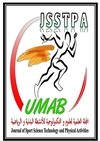تهدف المجلة إلى الإسهام في تطوير البحث العلمي في ميدان علوم وتقنيات النشاطات البدنية والرياضية، من خلال تشجيع البحوث الأصيلة التي تجمع بين الجانب النظري والتطبيقي، وتقديم منصة للنقاش الأكاديمي بين الأساتذة والباحثين وطلبة الدراسات العليا.
وتتناول المجلة بالبحث والتحليل طيفًا واسعًا من الموضوعات، من بينها:
- علوم وتقنيات النشاطات البدنية والرياضية؛
- التدريب الرياضي وعلوم الحركة؛
- فسيولوجيا المجهود البدني؛
- علم النفس الرياضي وعلم الاجتماع الرياضي؛
- التربية البدنية والرياضية؛
- التكنولوجيات الحديثة في المجال الرياضي؛
- الإدارة والتسيير الرياضي؛
- الطب الرياضي وإصابات الرياضة؛
- التربية الصحية والنشاط البدني الوقائي؛
- منهجية البحث العلمي في علوم الرياضة.
كما ترحب المجلة بالدراسات البينية والتطبيقية التي تربط بين النشاط البدني ومجالات مثل الصحة، والتعليم، والتغذية، والذكاء الاصطناعي، والابتكار التكنولوجي في المجال الرياضي.



